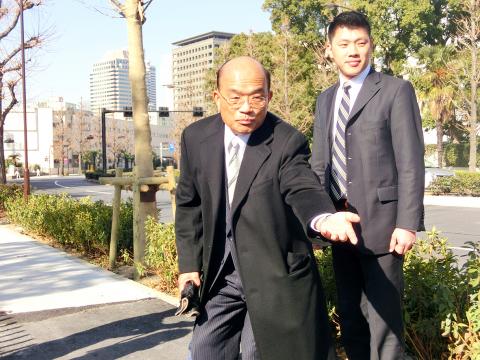Taiwan-Japan relations could be strengthened to promote regional stability because both countries share the values of democracy, freedom and human rights, Democratic Progressive Party (DPP) Chairman Su Tseng-chang (蘇貞昌) said in Tokyo yesterday.
“The DPP hopes that Taiwan and Japan can strengthen their bilateral partnership as members of a democratic alliance, which would make the Asia-Pacific a region of security, stability and prosperity by promoting dialogue and closer engagement,” Su said on the second day of his five-day visit to Japan.
Taiwan, Japan, South Korea and the US all share those same values, said the DPP chairman, who is leading a 30-member delegation on his first overseas trip since assuming the party leadership in May last year.

Photo: Lee Hsin-fang, Taipei Times
Su made the comments during his visit to the Japan-Republic Of China Diet Members’ Consultative Council, a pro-Taiwan parliamentary group in the Japanese Diet, and met its president — Japanese Senator Takeo Hiranuma.
Su reiterated Taiwanese affinity with Japan, saying that this was not only because of the close proximity of the two countries, but also because of a long history of bilateral trade and cultural exchanges.
The assistance offered by the nations to each other after the Japanese earthquake in March 2011 and the 921 Earthquake in Taiwan in 1999 was solid evidence of a strong friendship, Su said.
Earlier yesterday afternoon, Su visited the ruling Liberal Democratic Party (LDP) headquarters and met LDP Secretary-General Shigeru Ishiba, a former defense minister, to exchange views on security in East Asia, the dispute over the Diaoyutai Islands (釣魚台), known as the Senkakus in Japan, and bilateral trade relations.
Speaking to Taiwanese media during a visit to the National Diet Building yesterday morning, Su dismissed reports concerning the cancelation of his meeting with Japan Restoration Party leader Shintaro Ishihara, a right-wing politician who initiated a spat over the disputed islands by proposing that Japan nationalize them.
Su said the main goals of his visit were to strengthen the Asia-Pacific democratic alliance and to promote regional stability and prosperity, rather than meeting certain politicians.
On the Diaoyutais dispute, Su said the most urgent task for Taiwan was the protection of fishing rights and that he was glad to see both sides are ready for a new round of negotiations.
In response to a media inquiry about domestic political affairs, the chairman said the appointments of Chang Chia-juch (張家祝) and Kuan Chung-ming (管中閔) as minister of economic affairs and Council for Economic Planning and Development minister “showed the Chinese Nationalist Party’s [KMT] talent drought.”
“The thing that this administration should carry out is probably not a change of personnel, but a change of policy, because [President] Ma [Ying-jeou’s (馬英九)] policies are being questioned by the people,” he said.
The delegation arrived in Tokyo on Sunday and is scheduled to return to Taipei on Thursday.

AIR SUPPORT: The Ministry of National Defense thanked the US for the delivery, adding that it was an indicator of the White House’s commitment to the Taiwan Relations Act Deputy Minister of National Defense Po Horng-huei (柏鴻輝) and Representative to the US Alexander Yui on Friday attended a delivery ceremony for the first of Taiwan’s long-awaited 66 F-16C/D Block 70 jets at a Lockheed Martin Corp factory in Greenville, South Carolina. “We are so proud to be the global home of the F-16 and to support Taiwan’s air defense capabilities,” US Representative William Timmons wrote on X, alongside a photograph of Taiwanese and US officials at the event. The F-16C/D Block 70 jets Taiwan ordered have the same capabilities as aircraft that had been upgraded to F-16Vs. The batch of Lockheed Martin

US President Donald Trump yesterday announced sweeping "reciprocal tariffs" on US trading partners, including a 32 percent tax on goods from Taiwan that is set to take effect on Wednesday. At a Rose Garden event, Trump declared a 10 percent baseline tax on imports from all countries, with the White House saying it would take effect on Saturday. Countries with larger trade surpluses with the US would face higher duties beginning on Wednesday, including Taiwan (32 percent), China (34 percent), Japan (24 percent), South Korea (25 percent), Vietnam (46 percent) and Thailand (36 percent). Canada and Mexico, the two largest US trading

GRIDLOCK: The National Fire Agency’s Special Search and Rescue team is on standby to travel to the countries to help out with the rescue effort A powerful earthquake rocked Myanmar and neighboring Thailand yesterday, killing at least three people in Bangkok and burying dozens when a high-rise building under construction collapsed. Footage shared on social media from Myanmar’s second-largest city showed widespread destruction, raising fears that many were trapped under the rubble or killed. The magnitude 7.7 earthquake, with an epicenter near Mandalay in Myanmar, struck at midday and was followed by a strong magnitude 6.4 aftershock. The extent of death, injury and destruction — especially in Myanmar, which is embroiled in a civil war and where information is tightly controlled at the best of times —

China's military today said it began joint army, navy and rocket force exercises around Taiwan to "serve as a stern warning and powerful deterrent against Taiwanese independence," calling President William Lai (賴清德) a "parasite." The exercises come after Lai called Beijing a "foreign hostile force" last month. More than 10 Chinese military ships approached close to Taiwan's 24 nautical mile (44.4km) contiguous zone this morning and Taiwan sent its own warships to respond, two senior Taiwanese officials said. Taiwan has not yet detected any live fire by the Chinese military so far, one of the officials said. The drills took place after US Secretary